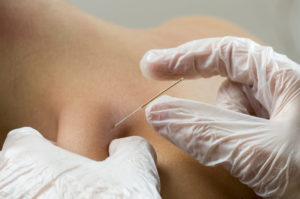Dry Needling vs. Acupuncture: Which Is Better?
 From an outsider’s perspective, dry needling and acupuncture would look identical: a series of tiny, thin, stainless steel needles inserted into strategic points of the body as a medical treatment. However, the use of these needles is where the similarities stop, as these practices are based on very different philosophies. Acupuncture is an ancient practice, while dry needling is more modern, and the benefits of dry needling are still being discovered. In order to determine which option is the best for you, it’s important to understand exactly what the differences are and what each practice can treat.
From an outsider’s perspective, dry needling and acupuncture would look identical: a series of tiny, thin, stainless steel needles inserted into strategic points of the body as a medical treatment. However, the use of these needles is where the similarities stop, as these practices are based on very different philosophies. Acupuncture is an ancient practice, while dry needling is more modern, and the benefits of dry needling are still being discovered. In order to determine which option is the best for you, it’s important to understand exactly what the differences are and what each practice can treat.
About Acupuncture
Based on ancient Asian tradition, acupuncture has been around for thousands of years and is practiced by tens of thousands of licensed acupuncturists. This history means that acupuncture is well established, including formal training programs and licensure boards that maintain industry standards in the United States. Acupuncture is considered a medical treatment and is even covered by some insurances.
This reputation comes from the documented benefits of acupuncture. The practice is shown to treat conditions such as pain, nausea, vomiting, headaches, menstrual cramps, allergies, and even chemical dependency.
The fundamental belief that acupuncture is based on is that illness is a result of blocked or interrupted Chi. Chi is meant to provide your body with healing energy, so acupuncture removes blockages, allowing this energy flow to be balanced. To achieve this, the small needles are inserted along the body’s meridian lines which are said to dictate this balance.
About Dry Needling
Dry needling is a much newer practice than acupuncture that is growing in popularity as a way of addressing muscular pain. Like acupuncture, dry needling involves several filiform needles being inserted into the body, but they are placed in different areas. Dry needling uses trigger points in your muscle or tissue in order to stimulate the knotted or hardened muscle and release tension or spasms.
Dry needling can be performed in a number of ways. Some practitioners leave the needles in for periods of time, while others use an in and out technique that is more like a consistent pricking. It is also common to insert the needles in the areas surrounding a muscular problem, rather than into the trigger point itself.
Because it is a newer practice, there is not a large body of research proving the benefits of dry needling, nor is there a single regulatory body. However, existing research indicates positive effects when using dry needling for pain relief.
Are Dry Needling and Acupuncture Safe?
Both procedures can have mild side effects, usually limited to bruising, bleeding, or temporary soreness at the site of insertion. These usually subside over time. Because there is no fluid or chemical used with the needles, there is no risk of an adverse reaction to these substances or an interaction with medications.
For both dry needling and acupuncture, the most important safety precaution to take is ensuring that all needles used are completely sterile and are disposed of after use. This will be the sign of a good practitioner and avoid cross-contamination, infection, or other serious problems.
Should I Get Dry Needling or Acupuncture?
Answering this question will depend on a range of factors, including your condition and preferences.
The two practices do not typically treat the same issues. Dry needling is exclusively used for muscular issues, relying on the philosophy of trigger points for intramuscular stimulation. While acupuncture can sometimes be used for muscular pain, it is a much more holistic practice and can be applied to a majority of illnesses and ailments. Dry needling may be a better choice for muscular concerns, but anything else could indicate that acupuncture is the best choice.
Some people choose their treatment based on a preference for a certain philosophy. Those more interested in Asian medicine, who subscribe to the idea of a Chi and the body’s meridian lines, may be more inclined toward acupuncture. The formalized oversight and regulation also make acupuncture a more comfortable choice for many.
However, others prefer the more scientific approach of dry needling and prefer a Western medicine practice. With promising results, dry needling is also a great choice for many people.
